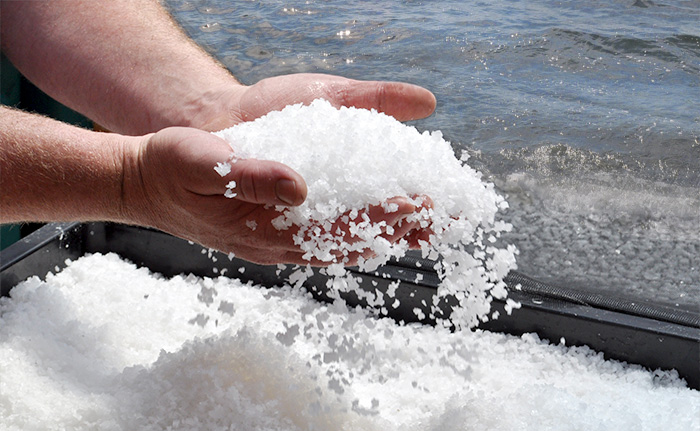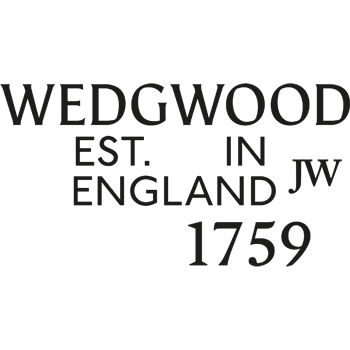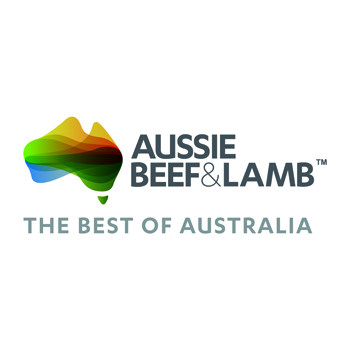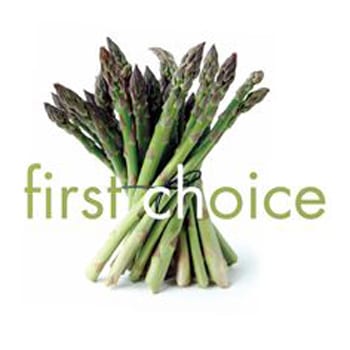Chefs – Do you Know your Salt?
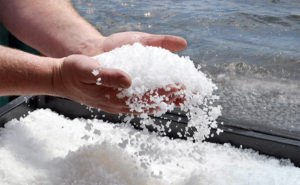
When it comes to food there is one ingredient that is inextricably linked: salt. It is so linked to food and life that common words in the English language owe their roots to salt. Two of these are salary and soldier. Salt was used to pay the wages of soldiers and others in ancient times.
However, more recently the image of salt has become about the effects of having too much in our diet and more about the dangers that poses.
In short what that means is that chefs need to be aware that lower salt dishes should be on the radar. This is not as easy as it might sound. The great Pierre Koffmann once said that the difference between a good chef and a great chef is a pinch of salt. Chefs are trained to taste their food and to adjust seasoning.
Readymade meals often contain high levels of salt to improve taste. Bar nuts were used to give drinkers a greater thirst, making them spend more on alcoholic beverages.
Salt and preservation in foods like bacon and smoked fish is integral to their identity. So, what to do?
One place to look is the origin of the salt you buy and cook with and one place we have discovered recently is in Pembrokeshire: The Pembrokeshire Sea Salt Company.
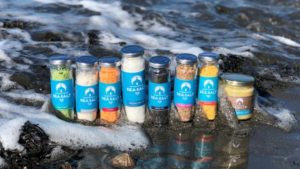 The business was set up in 2016 by Sherill Evans and Josh Wright who saw an opportunity to turn seawater into pure salt flakes. The way it always used to be done. It’s interesting that in ancient times armies would create their salt-drying areas before they went into battle so their food always contained enough goodness for the soldiers.
The business was set up in 2016 by Sherill Evans and Josh Wright who saw an opportunity to turn seawater into pure salt flakes. The way it always used to be done. It’s interesting that in ancient times armies would create their salt-drying areas before they went into battle so their food always contained enough goodness for the soldiers.
Salt has always been a critical component in food and remains so. The modern challenge is to harness salt’s goodness and use it for its health benefits in a way that is good for diners and doesn’t overload their daily intakes. This is especially relevant for chefs working in healthcare and public catering.
The key to finding a good salt is to look at its makeup. Industrial salt has been industrially heated at high temperatures to achieve its consistency and had added ingredients to stop it from caking and sticking together.
Sea salt is the opposite of this. It is sea water that has been dried slowly into pure white flakes or crystals – the old-fashioned way. This increases its mineral and health benefits and also brings with it the flavours and components of where it comes from. The sea water off the coast of Pembrokeshire is especially pure and makes marvelous salt.
Josh Wright, Director of Pembrokeshire Sea Salt says
“Chefs, if you give a flying fish about your flavours, don’t just add salt, add Pembrokeshire Sea Salt. Flavour and provenance mean everything to us, and to our customers too. Everyday we strive to make seasonings that are sustainably sourced, good looking and of course tasty! We also like to be a little bit different, so our range of sea salts is colourful, flavoursome, unique and inspired by nature.”
Pembrokeshire Sea Salt has recently sponsored a Hospitality Industry Taster Day set to take place on the 12th May for secondary school pupils thinking of choosing a course in hospitality and catering at Pembrokeshire College. Pinch pots of salt flakes and jars of salted caramel are being sent out to the schools taking part to add a 3D element to what would otherwise be a virtual event. The students will see top Welsh chefs cooking with the salt and will watch a film on salt production.
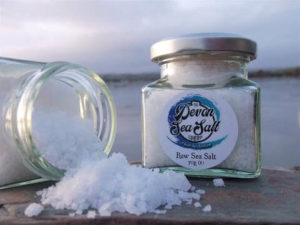 New kid on the (salt) block, Devon Sea Salt is another regional variety of naturally harvested sea salt from the Devon coast in the South West, launched just before Christmas in November 2020.
New kid on the (salt) block, Devon Sea Salt is another regional variety of naturally harvested sea salt from the Devon coast in the South West, launched just before Christmas in November 2020.
Their process of producing proper honest and sustainable sea salt is utilises traditional techniques with a hint of modern.
It is this approach which owners Chris and Anna-Marie Hambley believe gives Devon Sea Salt its character, appearance and punchy taste.
Chris says
“Our salt house uses no commercial boilers and no machines in fact no mass production methods at all, everything is carried out in the traditional way, by hand, by us and using just nature to produce our sea salt.,
Natural Sea salt production is a slow process and cannot be rushed. We can only harvest the salt crystals when they are ready and not before. It is the time we take over the whole process which makes sure that the salt we produce is enriched with the natural minerals from the sea water and this produces a superior taste and crystal structure.”
“Because of this process we do not need to add chemicals or anti clumping agents like many other salts available on the market, Our sea salt contains only what is found naturally in salt water and nothing else.
“All of our sea water is collected from the South Devon coastline and the salt is harvested within our small family run salt house overlooking the river Tamar. The process we use to produce our fresh crisp sea salt is always evolving to ensure we are as environmentally friendly as possible while retaining our true hand-harvested approach.”
Two great producers showcasing natural sea salt harvested from two very different areas or terroirs if we were to compare them to regional wine varieties – Hence the taste being completely different and Pembrokeshire majoring on flakes, while Devon sea salt sells crystals.
Both companies are constantly looking of ways in which to diversify into new product ranges and have many exciting plans afoot. The Chefs’ Forum will be following the progress of both producers and keeping you updated with all of the latest news on the salt front!
